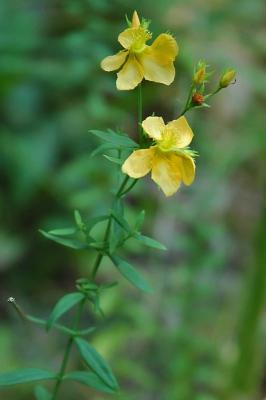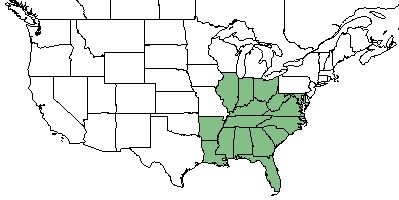Difference between revisions of "Hypericum virgatum"
(→Taxonomic Notes) |
(→Ecology) |
||
| Line 31: | Line 31: | ||
===Habitat=== <!--Natural communities, human disturbed habitats, topography, hydrology, soils, light, fire regime requirements for removal of competition, etc.--> | ===Habitat=== <!--Natural communities, human disturbed habitats, topography, hydrology, soils, light, fire regime requirements for removal of competition, etc.--> | ||
''H. virgatum'' is found in hardpan woodlands, rock outcrops, woodland borders, glades and barrens (especially over mafic or ultramafic rocks). <ref name= "Weakley 2015"> Weakley, A. S. (2015). Flora of the Southern and Mid-Atlantic States. Chapel Hill, NC, University of North Carolina Herbarium. </ref> Specimens have been collected from loamy sand of longleaf pineland, shore of ponds, moist marl-like soil in full sun, and damp meadows. <ref name = "FSU herbarium"> URL: http://herbarium.bio.fsu.edu. Last accessed: June 2018. Collectors: Debbie Milonski, R.K. Godfrey, Gary Knight, Leon Neel, David Webb, R. Komarek, J.B. Nelson, Albert B. Pittman. States and counties: South Carolina (Clarendon) Georgia (Thomas, Baker, Turner, Grady) Kentucky (Calloway) Florida (Santa Rosa, jackson, Escambia, Walton)</ref> | ''H. virgatum'' is found in hardpan woodlands, rock outcrops, woodland borders, glades and barrens (especially over mafic or ultramafic rocks). <ref name= "Weakley 2015"> Weakley, A. S. (2015). Flora of the Southern and Mid-Atlantic States. Chapel Hill, NC, University of North Carolina Herbarium. </ref> Specimens have been collected from loamy sand of longleaf pineland, shore of ponds, moist marl-like soil in full sun, and damp meadows. <ref name = "FSU herbarium"> URL: http://herbarium.bio.fsu.edu. Last accessed: June 2018. Collectors: Debbie Milonski, R.K. Godfrey, Gary Knight, Leon Neel, David Webb, R. Komarek, J.B. Nelson, Albert B. Pittman. States and counties: South Carolina (Clarendon) Georgia (Thomas, Baker, Turner, Grady) Kentucky (Calloway) Florida (Santa Rosa, jackson, Escambia, Walton)</ref> | ||
| − | + | ||
| + | ===Phenology=== <!--Timing off flowering, fruiting, seed dispersal, and environmental triggers. Cite PanFlora website if appropriate: http://www.gilnelson.com/PanFlora/ --> | ||
| + | This species generally flowers from late June until September.<ref name= "Weakley 2015"/> | ||
<!--===Seed dispersal===--> | <!--===Seed dispersal===--> | ||
<!--===Seed bank and germination===--> | <!--===Seed bank and germination===--> | ||
Revision as of 10:56, 30 May 2019
Common name: sharpleaf St. Johnswort [1], strict St. Johnswort [2]
| Hypericum virgatum | |
|---|---|

| |
| Photo by Gary Fleming at the Digital Atlas of the Virginia Flora | |
| Scientific classification | |
| Kingdom: | Plantae |
| Division: | Magnoliophyta - Flowering plants |
| Class: | Magnoliopsida - Dicots |
| Order: | Theales |
| Family: | Clusiaceae |
| Genus: | Hypericum |
| Species: | H. virgatum |
| Binomial name | |
| Hypericum virgatum Lam. | |

| |
| Natural range of Hypericum virgatum from USDA NRCS Plants Database. | |
Contents
Taxonomic Notes
Synonyms: H. denticulatum Walter var. acutifolium (Elliott) Blake; H. denticulatum Walter var. recognitum Fernald & Schubert; H. denticulatum Walter; H. acutifolium Elliott; H. denticulatum Walter ssp. acutifolium (Elliott) N. Robson
Description
H. virgatum is a perennial forb/herb of the Clusiaceae family native to North America. [1]
Distribution
H. virgatum is found in the southeastern corner of the United States from Arkansas and Louisiana to Virginia and Maryland, as well as in Illinois, Indiana, and Ohio. [1]
Ecology
Habitat
H. virgatum is found in hardpan woodlands, rock outcrops, woodland borders, glades and barrens (especially over mafic or ultramafic rocks). [2] Specimens have been collected from loamy sand of longleaf pineland, shore of ponds, moist marl-like soil in full sun, and damp meadows. [3]
Phenology
This species generally flowers from late June until September.[2]
Conservation and Management
Cultivation and restoration
Photo Gallery
References and notes
- ↑ 1.0 1.1 1.2 USDA Plant Database https://plants.usda.gov/core/profile?symbol=HYVI6
- ↑ 2.0 2.1 2.2 Weakley, A. S. (2015). Flora of the Southern and Mid-Atlantic States. Chapel Hill, NC, University of North Carolina Herbarium.
- ↑ URL: http://herbarium.bio.fsu.edu. Last accessed: June 2018. Collectors: Debbie Milonski, R.K. Godfrey, Gary Knight, Leon Neel, David Webb, R. Komarek, J.B. Nelson, Albert B. Pittman. States and counties: South Carolina (Clarendon) Georgia (Thomas, Baker, Turner, Grady) Kentucky (Calloway) Florida (Santa Rosa, jackson, Escambia, Walton)